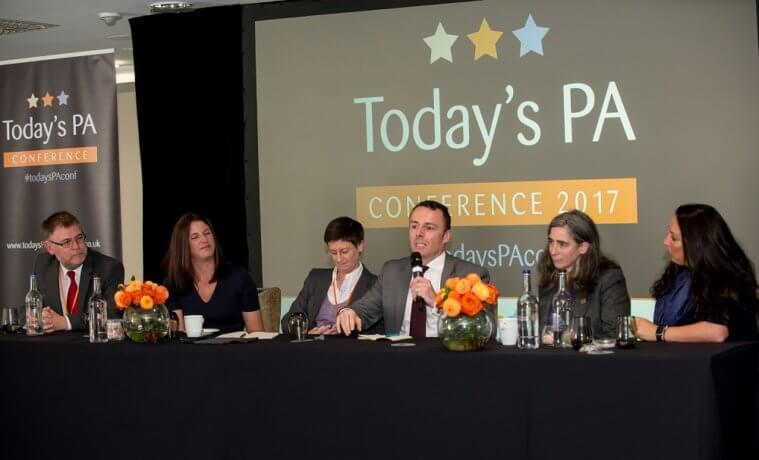Shopping cart
Your cart is empty
£0.00

This year’s Today’s PA Conference which took place in August brought together over 100 PAs and EAs from across the country.
One session eagerly anticipated at this year’s conference was our expert panel discussion on what business leaders look for in their PAs. The panel featured an enormous amount of experience and talent: a former Paralympian, General Manager of the Institute of Administrative Management (IAM), a former Equerry, an HR Director in a highly competitive industry, the MD of an international networking group, and one of the most influential women in the European Financial sector.
Through a range of questions from delegates, we learned how our panel approached the recruitment process, what they focused upon, and what characteristics make a great PA.
But starting at the beginning, what do business leaders look for in their PA?
Trust, integrity, and honesty. All of the panel agreed that these three words were top of the list of priorities, forming the basis of a strong working relationship, first and foremost between boss and PA, but also between PA and their team/department/organisation. As core skills – typing, IT, etc. – were seen as a given these days, our panel looked for something more in a PA’s skillset: ability to organise and juggle conflicting priorities, flexibility and adaptability, and a willingness to keep on learning.
The question of formal qualifications came up, with one delegate asking if an applicant who had little in the way of formal qualifications would automatically be disadvantaged from the outset by not meeting the role’s personal specification. This led to the further question of whether younger PAs with less work experience were at a disadvantage when it came to job hunting.
Andrew Jardine, General Manager of the Institute of Administrative Management (IAM), said that, although qualifications certainly weren’t the ‘be all and end all’, employers could receive hundreds of applications for a single job vacancy, and qualifications were another filter they used to find their ideal candidate. This did not necessarily mean certificates gained at school, college or university, but included qualifications and training undertaken independently which can show that a PA wished to take their career in a certain direction.
This caused a great deal of animated discussion among the other panel members! Claire Harvey, a former Paralympian and now CEO of Diversity Role Models, thought that personality fit was much more important when recruiting a new assistant. Rather than looking at qualifications, she looked for a PA who saw things from a different angle, and had a complementary skillset to her own.
Peter Flynn – a former Equerry and now Director with PwC – said that he didn’t look too closely at the qualifications but instead considered the overall team dynamic, asking himself “will this person fit into the department and work well with the other PAs?” Thinking back to the top three priorities, he shared one his most interesting interview questions, “what can’t you do?”. Whereas CVs and interviews highlight what you can do, he felt that asking the question “what can’t you do?” is really asking “how honest can you be?”.
Nicola Salter, HR Director with Williams Formula 1, said that qualifications, CVs, and application forms only gave a brief snapshot of the person, and the interview was where you found out if there would be a personality fit, and a positive effect on the team dynamic. She would ask herself if this person would get along with colleagues, directors, clients, and stakeholders. Would they be adaptable enough to work with the wide range of personalities in the organisation? She thought it was vital to look beyond the CV, and get to know the person in the interview.
Julia Hoggett, Director of Market Oversight at the Financial Conduct Authority (FCA) felt that sifting candidates by qualifications might hold back precisely those applicants who would be the best fit for the organisation and bring the most passion to the role. Her approach was first to look at the detail in the CV and try to see past the experience and qualifications, considering their broader range of skills.
Vanessa Vallely – founder and Managing Director of WeAreTheCity – also looked at the wider picture, focusing less on qualifications, and more on the attitude of the PA. Regardless of the age and experience, it was their willingness to learn – and the pace at which they were willing to learn – that she regarded as a key factor. A further point to keep in mind was that, hopefully, the PA could be with the organisation for a long time, being promoted or moving on to a different role. So it was important to consider the PA’s values and beliefs in a wider context to see how these broadly aligned those of the business.
This prompted the question of recruiting for managers not used to working with a Personal Assistant, and how PAs should best approach this situation. Vanessa said that in this instance, understanding their team dynamic and considering the personality fit was even more important, so she would take the time to think how these two people would work together. She added that the best way for PAs to ‘train’ their bosses was to be pro-active, to show what you could take from their workload, and discuss how you can work together to help achieve their aims and objectives.
Nicola pointed out that if a manager hasn’t worked with a PA before, they may be unaware of how much this can change their life. In a world of technology – emails, calendars, etc., – it’s tempting for bosses to sometimes think they can do it all, and therefore don’t need a PA. Nicola herself did not have a PA until she first started with Williams, but after a week, she wondered what she’d done without one!
Following on from this, panel was asked about emails, and whether they thought a PA should always manage or have unfettered access to a boss’s inbox. For example, if there were to be redundancies in the company, with the boss receiving emails containing sensitive or highly confidential information, could this perhaps cause a problem? The panel all agreed that PAs understood their privileged positions, and in order for them to do their job, they needed to know and understand what was happening in the organisation, adding that, where there was a strong working relationship, PAs would already be aware of the situation and not find out through an email!
Peter said that it went back to the question of trust, honesty and integrity. It was important for a manager to feel they can trust their PA with that confidential information. But at the same time, it was “horses for courses”, with the manager and PA deciding what would work best for them.
One thing that did concern the panel was PAs trying to “be” their boss, sending emails in the boss’s name. All felt it was essential that ground rules be set from the beginning to enable both parties to work effectively.
Another delegate asked what should happen if a PA was told something, informally and in confidence, but felt that their manger needed to know?
This question led to a lot of discussion, both among the panel and among the delegates. Vanessa said that because of their role, PAs are seen as trusted individuals within the organisation, therefore a colleague who might be uncomfortable speaking to a senior manager about certain issues, might instead talk to their PA. This might be formally or just in a conversation after work. The PA needed to rely on their own judgement to decide if it was something their boss should know. It may be an operational risk, or the colleague may have spoken to the PA precisely in the hope that the boss would be made aware of it. Julia thought that as the PA would know both their boss and the individual involved as well as being aware of the wider issues in the organisation, they could use their own judgement on whether or not to bring the matter to the boss’s attention.
The delegates felt that as they were using their judgement daily to make decisions that included others, they would hopefully be able to make the right call and decide how best to handle this scenario. It may be that, nine times out of ten, there was no need to inform their boss – but occasionally depending on the circumstances, it may be appropriate or even essential.
Peter said that PAs can provide their boss with invaluable feedback on how the organisation or department was working. As a boss, you may believe things are operating one way when it’s actually working in another. Julia added that because PAs work with many other departments, not just their own, they understood the way the office worked, and the dynamics within the different teams.
Another question was about PAs moving on in the organisation. If their PA wanted to move to another department or to go for a promotion, what would they say? The panel’s advice was to give the PA whatever support you could, saying that as much as you wanted to hold onto a fantastic PA, you needed to give them that opportunity.
With regard to the different roles PAs could move to, Vanessa said that several assistants she’d worked with had gone into PMO roles. However, because of their wide and varied skillset, there were many other departments PAs could move into, such as marketing, HR, or finance.
Peter said that PAs needed to remember that the interview is a two-way process, and they should ask as many questions as the interviewer. His advice to PAs was to seek out those organisations who understood the range of skills that PAs had, knew how those skills could be transferred, and actively promoted PAs into other roles within the company.
To bring the session to a close, both panel and delegates were asked whether there was a need for PAs to speak at other industry conferences, to talk about the importance and the value of a PA to bosses and to businesses. Picking up on Nicola’s point, the moderator said that many managers didn’t understand that trying to “do it all” was a false economy, and made them less effective in the long run. He wondered if, by acting as guest speakers at other events, PAs could boost the profile of their industry in today’s business world.
There was a unanimous feeling in the room that PAs should have more of a voice, and needed to educate employers on the true worth of a PA, helping them understand that the PA role wasn’t stuck in the past, but part of the 21st century office.
Today’s PA team is already working on next year’s Today’s PA Conference which will take place 16-17 August 2018 in Central London.



Tel.: +44 (0)20 7622 2400
Email: info@todayspa.co.uk
Today's PA
52 The Warwick Building
Chelsea Bridge Wharf
366 Queenstown Road
London
SW11 8NJ
Copyright © 2024 Today's PA. All rights Reserved.
We use cookies, just to track visits to our website, we store no personal details.
ACCEPT COOKIES What are cookies?